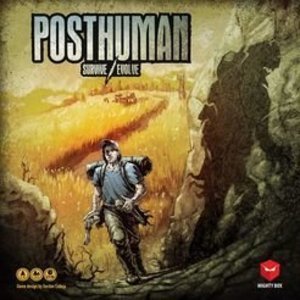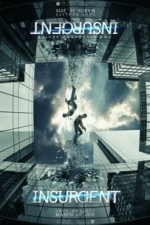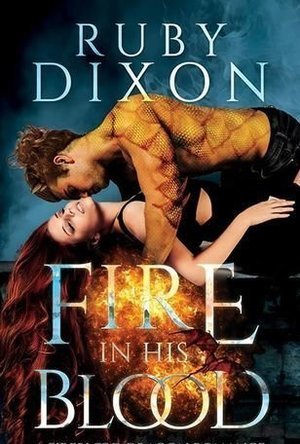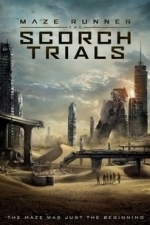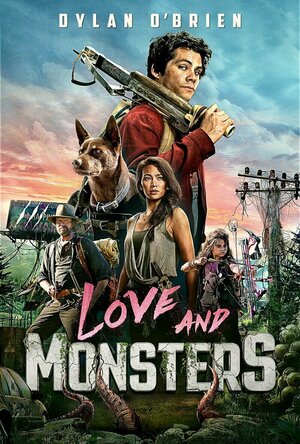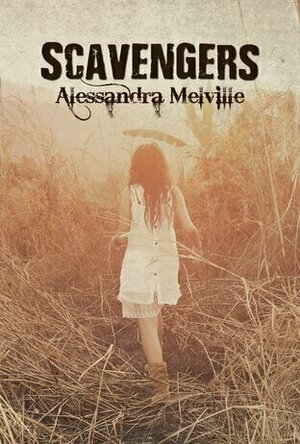Search
Purple Phoenix Games (2266 KP) rated Posthuman in Tabletop Games
Aug 25, 2021
So many storytellers have attempted to predict, or at least depict, the future of humanity. Many assert that a cataclysmic event will trigger some dark post-apocalyptic culture of humanity’s last breath on Earth. Others would have us fleeing to the stars to colonize and begin our species anew. But what if the former was correct and instead of becoming X-Men humans would rapidly mutate and become… something else entirely?
Posthuman is set in that dark post-apocalyptic horrorscape and is an exploration adventure game with character upgrading and dice-driven combat. The twist here is that humans are trying to escape the mutant creatures to The Fortress, a safe haven for all, but once infected may turn mutant and also turn on the party to prevent that glorious end. In this review, however, I will be playing through the solo rules, and they do not have players turning into mutants during the game. Bummer, eh?
DISCLAIMER: We are using the Kickstarter Deluxe version of the game. We do have the Defiant expansion from the KS campaign, but will not be using it for this review (I don’t think). Also, we do not intend to cover every single rule included in the rule book, but will describe the overall game flow and major rule set so that our readers may get a sense of how the game plays. For more in depth rules, you may purchase a copy from the publisher directly or from your FLGS. -T
To setup consult the rulebook, as there are so many decks of cards and character setup steps that need to happen that I just cannot detail here. Once setup your play area will look something like the photo below. Once setup is complete you are ready to begin your journey to The Fortress.
Posthuman is played over a series of rounds until the player wins or loses. The only way to win is to enter The Fortress before the Event deck runs out, and obviously the only way to lose is to run the Event deck out of cards or become a mutant by suffering five scars.
A round consists of several phases. The first phase is Event Resolution. The player will flip the top Event card and resolve its text. These Events could be a one-shot bad (or good) thing for the player, or may be an ongoing Seasonal Event that will stay in play until another Seasonal Event is drawn.
After the Events, characters will need to Eat to survive. Characters will be able to forage for food in a subsequent phase, but know that food is very important and if characters go too long without eating they will be suffering penalties of their Health and Morale.
Once fed (or starved, I suppose), the player will Declare an Action from the following: Camp, Forage, Scout, or Move (in multiplayer there is an additional action as well). To Camp players will forego any other action to heal their character. When a character Forages they will flip the current tile’s marker to show it may no longer be foraged and draw a Supplies card to see what supplies they will be able to gather. These could be more food tokens, ammo, equipment or weapons. To Scout a character will draw terrain tiles equal to the number of exits shown on their current terrain tile. The player will place the tiles however they want and this will provide insight into future locations and what they may hold. Lastly a player may Move into a connected terrain tile and begin having encounters upon it.
Most of the action in Posthuman comes as a result of having encounters on terrain tiles. Depending on where the character meeple is located on the Central Board track encounters will be drawn from the level one, two, or three decks and encountered immediately. Most of the encounters are combats, and I could write another whole post on combat, but I will spare you the details and merely say that combat is very involved and encompasses many steps to resolve. At the end of the combat a character may receive the encountered creature card as a VP trophy to be spent later on upgrades. The VP card may also instruct the player to move the meeple one space closer to The Fortress on the Central Board track. The other type of encounter card presents choices for the player to make or stat tests to overcome via die rolls.
Play continues in this fashion until the player wins by reaching The Fortress, or by losing to the forces set against them.
Components. This box is chock FULL of components and they are all super high-quality and enjoyable to play with. I do have a couple issues with some bits. Firstly, the player boards are quite small, and the tracking cubes are not meant for big meaty paws at all. Similarly, the tracking chits to be used for stats on the player board are flimsy and don’t really stay in place too well. Also the game comes with two different shades of gray player meeple colors and NOT a purple option. Shame! Shame! Shame!
When all is said and done Posthuman delivers an exciting experience on the table for a solo player and indulges the player’s need to roll dice on the regular. Just me? Didn’t think so. The combat is great, but I found myself discarding more enemies than defeating in some games and that is quite annoying. One game I refused to Scout at all and that totally bit me in the booty. So Scout, y’all.
Just know that playing this solo is NOT a cakewalk at all. I watched a playthrough video where the host won the game but nearly every roll of the die was favorable and every combat successful. Even still, she nearly ran out of time and lost the game. So games really can come down to the wire. Now, I haven’t really gotten very close to winning yet, but my day is coming!
I like this one a lot, and will certainly be going back to it for my solo plays. I have been playing some really great solo games lately, and I am very thankful for that. Posthuman, however, I don’t think will get much multiplayer action at my house. The rules are plentiful and the people I normally game with do not enjoy rules-heavy games. Similarly, I don’t think the theme is for everyone. I dig it, but different strokes and all. If you are in the market for a new (to you) game that can be played solo or multiplayer with an interesting theme and is pretty difficult, look up Posthuman. Just stay away from the mutants. These do NOT want to recruit you to their school for gifted people.
Posthuman is set in that dark post-apocalyptic horrorscape and is an exploration adventure game with character upgrading and dice-driven combat. The twist here is that humans are trying to escape the mutant creatures to The Fortress, a safe haven for all, but once infected may turn mutant and also turn on the party to prevent that glorious end. In this review, however, I will be playing through the solo rules, and they do not have players turning into mutants during the game. Bummer, eh?
DISCLAIMER: We are using the Kickstarter Deluxe version of the game. We do have the Defiant expansion from the KS campaign, but will not be using it for this review (I don’t think). Also, we do not intend to cover every single rule included in the rule book, but will describe the overall game flow and major rule set so that our readers may get a sense of how the game plays. For more in depth rules, you may purchase a copy from the publisher directly or from your FLGS. -T
To setup consult the rulebook, as there are so many decks of cards and character setup steps that need to happen that I just cannot detail here. Once setup your play area will look something like the photo below. Once setup is complete you are ready to begin your journey to The Fortress.
Posthuman is played over a series of rounds until the player wins or loses. The only way to win is to enter The Fortress before the Event deck runs out, and obviously the only way to lose is to run the Event deck out of cards or become a mutant by suffering five scars.
A round consists of several phases. The first phase is Event Resolution. The player will flip the top Event card and resolve its text. These Events could be a one-shot bad (or good) thing for the player, or may be an ongoing Seasonal Event that will stay in play until another Seasonal Event is drawn.
After the Events, characters will need to Eat to survive. Characters will be able to forage for food in a subsequent phase, but know that food is very important and if characters go too long without eating they will be suffering penalties of their Health and Morale.
Once fed (or starved, I suppose), the player will Declare an Action from the following: Camp, Forage, Scout, or Move (in multiplayer there is an additional action as well). To Camp players will forego any other action to heal their character. When a character Forages they will flip the current tile’s marker to show it may no longer be foraged and draw a Supplies card to see what supplies they will be able to gather. These could be more food tokens, ammo, equipment or weapons. To Scout a character will draw terrain tiles equal to the number of exits shown on their current terrain tile. The player will place the tiles however they want and this will provide insight into future locations and what they may hold. Lastly a player may Move into a connected terrain tile and begin having encounters upon it.
Most of the action in Posthuman comes as a result of having encounters on terrain tiles. Depending on where the character meeple is located on the Central Board track encounters will be drawn from the level one, two, or three decks and encountered immediately. Most of the encounters are combats, and I could write another whole post on combat, but I will spare you the details and merely say that combat is very involved and encompasses many steps to resolve. At the end of the combat a character may receive the encountered creature card as a VP trophy to be spent later on upgrades. The VP card may also instruct the player to move the meeple one space closer to The Fortress on the Central Board track. The other type of encounter card presents choices for the player to make or stat tests to overcome via die rolls.
Play continues in this fashion until the player wins by reaching The Fortress, or by losing to the forces set against them.
Components. This box is chock FULL of components and they are all super high-quality and enjoyable to play with. I do have a couple issues with some bits. Firstly, the player boards are quite small, and the tracking cubes are not meant for big meaty paws at all. Similarly, the tracking chits to be used for stats on the player board are flimsy and don’t really stay in place too well. Also the game comes with two different shades of gray player meeple colors and NOT a purple option. Shame! Shame! Shame!
When all is said and done Posthuman delivers an exciting experience on the table for a solo player and indulges the player’s need to roll dice on the regular. Just me? Didn’t think so. The combat is great, but I found myself discarding more enemies than defeating in some games and that is quite annoying. One game I refused to Scout at all and that totally bit me in the booty. So Scout, y’all.
Just know that playing this solo is NOT a cakewalk at all. I watched a playthrough video where the host won the game but nearly every roll of the die was favorable and every combat successful. Even still, she nearly ran out of time and lost the game. So games really can come down to the wire. Now, I haven’t really gotten very close to winning yet, but my day is coming!
I like this one a lot, and will certainly be going back to it for my solo plays. I have been playing some really great solo games lately, and I am very thankful for that. Posthuman, however, I don’t think will get much multiplayer action at my house. The rules are plentiful and the people I normally game with do not enjoy rules-heavy games. Similarly, I don’t think the theme is for everyone. I dig it, but different strokes and all. If you are in the market for a new (to you) game that can be played solo or multiplayer with an interesting theme and is pretty difficult, look up Posthuman. Just stay away from the mutants. These do NOT want to recruit you to their school for gifted people.
Movie Metropolis (309 KP) rated Insurgent (2015) in Movies
Jun 10, 2019
A little soulless
There hasn’t been a better time to be part of the Young Adult revolution. From Stephanie Meyer’s underwhelming Twilight saga to Suzanne Collins’ superb Huger Games trilogy and everything in between, there is something about this genre that audiences love to read and to watch.
Coming a little late to the party is Veronica Roth’s Divergent franchise. After last year’s bland debut, a new director in the shape of Robert Schwentke (Flightplan, Tattoo) takes on the second film in the series, Insurgent, but can it finally bring something to the table?
Insurgent continues the story of a post-apocalyptic America that has been divided into ‘factions’ based on the personality traits of survivors. Being placed in a faction helps you live your life in accordance with the rules of the governing body of the time. However, having traits belonging to all five categories makes you a Divergent – a risk to peace in other words.
This action sequel follows Tris Prior (Shailene Woodley) and Four Eaton (Theo James), two Divergents on the run from Kate Winslet’s domineering Jeanie Matthews as they try to find out the truth about who they are and what is really going on behind the scenes.
For the uninitiated, Insurgent is a tiresome process and requires some prior knowledge of the first film to truly understand what is going on. However, in comparison to its dull and overly long predecessor, there is much to enjoy here.
The obliterated city of Chicago is given much more room to breathe and the beautifully choreographed shots of well-known landmarks draped in moss and ferns are a stunning addition and look much more realistic than the computer-generated imagery used for the Capitol in the Hunger Games series.
Moreover, there are some great acting performances scattered throughout, Woodley really gets her teeth stuck into the lead role after her disappointing turn in Divergent and Theo James provides the eye candy in a Liam Hemsworth-esque characterisation.
However, it is in Kate Winslet and newcomer Naomi Watts’ performances that we really see something special.
Despite their lack of screen time, they command each sequence they are a part of and it’s a shame they’re not used more throughout the near 2 hour runtime.
Unfortunately comparisons to other YA adaptations are unavoidable. Put Insurgent up against its main rival The Hunger Games: Catching Fire and the odds simply aren’t in its favour. The sheer star power the latter film commands is enviable and despite Winslet and Watts’ excellent performances, it just isn’t quite enough.
It all feels a little hollow, a bit flat and non-descript as the audience is thrown from one mildly entertaining set piece to another, right up until the obligatory gasps as you realise it’s another year to pick up where that cliff-hanger left things.
In the end, Insurgent improves on its overly convoluted predecessor and is much better than anything the Twilight saga threw at us, but it pales in comparison to the treat of watching ‘The Girl on Fire’ strut her stuff.
Alas, sitting in the middle isn’t quite enough in this highly competitive genre and despite some stunning cinematography and great acting, Insurgent feels a little soulless.
https://moviemetropolis.net/2015/03/22/a-little-soulless-insurgent-review/
Coming a little late to the party is Veronica Roth’s Divergent franchise. After last year’s bland debut, a new director in the shape of Robert Schwentke (Flightplan, Tattoo) takes on the second film in the series, Insurgent, but can it finally bring something to the table?
Insurgent continues the story of a post-apocalyptic America that has been divided into ‘factions’ based on the personality traits of survivors. Being placed in a faction helps you live your life in accordance with the rules of the governing body of the time. However, having traits belonging to all five categories makes you a Divergent – a risk to peace in other words.
This action sequel follows Tris Prior (Shailene Woodley) and Four Eaton (Theo James), two Divergents on the run from Kate Winslet’s domineering Jeanie Matthews as they try to find out the truth about who they are and what is really going on behind the scenes.
For the uninitiated, Insurgent is a tiresome process and requires some prior knowledge of the first film to truly understand what is going on. However, in comparison to its dull and overly long predecessor, there is much to enjoy here.
The obliterated city of Chicago is given much more room to breathe and the beautifully choreographed shots of well-known landmarks draped in moss and ferns are a stunning addition and look much more realistic than the computer-generated imagery used for the Capitol in the Hunger Games series.
Moreover, there are some great acting performances scattered throughout, Woodley really gets her teeth stuck into the lead role after her disappointing turn in Divergent and Theo James provides the eye candy in a Liam Hemsworth-esque characterisation.
However, it is in Kate Winslet and newcomer Naomi Watts’ performances that we really see something special.
Despite their lack of screen time, they command each sequence they are a part of and it’s a shame they’re not used more throughout the near 2 hour runtime.
Unfortunately comparisons to other YA adaptations are unavoidable. Put Insurgent up against its main rival The Hunger Games: Catching Fire and the odds simply aren’t in its favour. The sheer star power the latter film commands is enviable and despite Winslet and Watts’ excellent performances, it just isn’t quite enough.
It all feels a little hollow, a bit flat and non-descript as the audience is thrown from one mildly entertaining set piece to another, right up until the obligatory gasps as you realise it’s another year to pick up where that cliff-hanger left things.
In the end, Insurgent improves on its overly convoluted predecessor and is much better than anything the Twilight saga threw at us, but it pales in comparison to the treat of watching ‘The Girl on Fire’ strut her stuff.
Alas, sitting in the middle isn’t quite enough in this highly competitive genre and despite some stunning cinematography and great acting, Insurgent feels a little soulless.
https://moviemetropolis.net/2015/03/22/a-little-soulless-insurgent-review/
Movie Metropolis (309 KP) rated Allegiant (2016) in Movies
Jun 11, 2019
A+ for effort
I think it’s probably fair to say that the Young Adult genre has become oversaturated due to the phenomenal success of The Hunger Games. Since coming to a slightly underwhelming conclusion last year, many new franchises have its crown firmly in their sights.
The Maze Runner was a muddled first outing with the second, Scorch Trials faring much better and the same can be said for the Divergent series. The first film was at times, an incomprehensible mess, while its follow-up, Insurgent was a thrilling if CGI-heavy and overlong affair.
Allegiant marks the first of two films ending the moderately successful series, with Ascendant being released in June next year. But does this split conclusion harm it as much as it did for Mockingjay?
Allegiant picks up immediately after the end of its predecessor with Tris Prior (Shailene Woodley), her lover Four (Theo James) and a group of friends leaving their once safe-haven of a post-apocalyptic Chicago in order to find a world beyond the wall, populated by others once thought forgotten. What ensues will change their lives forever.
The cast is on form in this instalment with Woodley growing into the role perfectly. It’s true that she’s no Jennifer Lawrence, and many would see her as a budget Katniss Everdeen, but she plays the character with a confidence only matched by her rival in the genre. Theo James gets a much larger role here too, and this is welcome, given his pivotal part in the novels.
Elsewhere, Naomi Watts does her best Julianne Moore impression and clearly watched the latter’s performance in Mockingjay to prepare for an incredibly similar role. Jeff Daniels is a nice addition as the Bureau of Genetic Welfare’s leader, David, though again, his acting prowess feels a little wasted.
Robert Schwentke directs the film with a unique colour palate and visual flair. Scenes “beyond the wall” are stunning and glisten with a red lick of paint, a welcome change from the staid, grey and blue many directors continue to use in blockbusters. It’s very Total Recall-esque in these sequences and better for it.
Unfortunately, once the plucky group of teens leave the Martian-like “Fringe” behind, the CGI kicks up a gear. This is where things start to unravel somewhat and Schwentke throws effect upon effect at the screen until there is hardly any realism left. On the whole, they’re pretty decent, but there are a few lapses that stop the film dead in its tracks, especially towards the cliff-hanger conclusion.
It’s also far too long. Much like Mockingjay, splitting the final book was an exercise in cash-grabbing rather than giving fans of the novels what they want. At over two hours in length, Allegiant drags in places and means the final film, as a whole, will be around four hours.
Nevertheless, there is much to enjoy here. The story for newcomers is incomprehensible and some of the dialogue is downright laughable, but for those of us continuing the saga, it’s an epic adventure with some cracking visuals, good acting and an intriguing plot – despite a few convoluted moments.
Overall, Allegiant is a film hampered by its timing. The similarities to The Hunger Games are obvious throughout, from exactly the same dialogue in certain scenes, to similar sets and similar casting decisions. But, if you can forget all that, it’s a fun, if overlong ride
https://moviemetropolis.net/2016/03/13/a-for-effort-divergent-allegiant-review/
The Maze Runner was a muddled first outing with the second, Scorch Trials faring much better and the same can be said for the Divergent series. The first film was at times, an incomprehensible mess, while its follow-up, Insurgent was a thrilling if CGI-heavy and overlong affair.
Allegiant marks the first of two films ending the moderately successful series, with Ascendant being released in June next year. But does this split conclusion harm it as much as it did for Mockingjay?
Allegiant picks up immediately after the end of its predecessor with Tris Prior (Shailene Woodley), her lover Four (Theo James) and a group of friends leaving their once safe-haven of a post-apocalyptic Chicago in order to find a world beyond the wall, populated by others once thought forgotten. What ensues will change their lives forever.
The cast is on form in this instalment with Woodley growing into the role perfectly. It’s true that she’s no Jennifer Lawrence, and many would see her as a budget Katniss Everdeen, but she plays the character with a confidence only matched by her rival in the genre. Theo James gets a much larger role here too, and this is welcome, given his pivotal part in the novels.
Elsewhere, Naomi Watts does her best Julianne Moore impression and clearly watched the latter’s performance in Mockingjay to prepare for an incredibly similar role. Jeff Daniels is a nice addition as the Bureau of Genetic Welfare’s leader, David, though again, his acting prowess feels a little wasted.
Robert Schwentke directs the film with a unique colour palate and visual flair. Scenes “beyond the wall” are stunning and glisten with a red lick of paint, a welcome change from the staid, grey and blue many directors continue to use in blockbusters. It’s very Total Recall-esque in these sequences and better for it.
Unfortunately, once the plucky group of teens leave the Martian-like “Fringe” behind, the CGI kicks up a gear. This is where things start to unravel somewhat and Schwentke throws effect upon effect at the screen until there is hardly any realism left. On the whole, they’re pretty decent, but there are a few lapses that stop the film dead in its tracks, especially towards the cliff-hanger conclusion.
It’s also far too long. Much like Mockingjay, splitting the final book was an exercise in cash-grabbing rather than giving fans of the novels what they want. At over two hours in length, Allegiant drags in places and means the final film, as a whole, will be around four hours.
Nevertheless, there is much to enjoy here. The story for newcomers is incomprehensible and some of the dialogue is downright laughable, but for those of us continuing the saga, it’s an epic adventure with some cracking visuals, good acting and an intriguing plot – despite a few convoluted moments.
Overall, Allegiant is a film hampered by its timing. The similarities to The Hunger Games are obvious throughout, from exactly the same dialogue in certain scenes, to similar sets and similar casting decisions. But, if you can forget all that, it’s a fun, if overlong ride
https://moviemetropolis.net/2016/03/13/a-for-effort-divergent-allegiant-review/
Beckie Shelton (40 KP) rated Fire in His Blood (Fireblood Dragon, #1) in Books
Feb 8, 2018
Reviewed By Beckie Bookworm.
https://www.beckiebookworm.com
<a href="http://s1376.photobucket.com/user/rosella1974/media/download_zps1ob3gct7.png.html"; target="_blank"><img src="http://i1376.photobucket.com/albums/ah5/rosella1974/download_zps1ob3gct7.png~original"; border="0" alt=" photo download_zps1ob3gct7.png"/></a>
<a href="http://s1376.photobucket.com/user/rosella1974/media/main-qimg-000ce57ec94f1c824cbfdea778662c28_zpsjcd12ec1.png.html"; target="_blank"><img src="http://i1376.photobucket.com/albums/ah5/rosella1974/main-qimg-000ce57ec94f1c824cbfdea778662c28_zpsjcd12ec1.png~original"; border="0" alt=" photo main-qimg-000ce57ec94f1c824cbfdea778662c28_zpsjcd12ec1.png"/></a>
🌟🌟🌟1/2 STARS
"Fire in the blood" was a surprisingly delightful read.
I have previously read Some of Ruby Dixon's Ice Planet Barbarian series and loved them.
This, in my opinion, was on an equal par with them and I do Love a sexy dragon shifter so I was on to a winner straight from the get-go.
This story is set in a post-apocalyptic dystopian future, where a few years previously rifts opened up in the sky and through these tear's came the dragons.
laying waste and destroying cities, Humanity is in hiding and the worlds gone to pot, everyone's only out for themselves.
Enter our gal Claudia, after being caught scavenging and thrown into a cell she earns an awful fate.
To be used as dragon bait, to see if she can tame a dragon.
Convinced she is going to be Scooby snack Claudia is astounded when the gold dragon flashes into a human, well almost human looking, he has claws and fangs and a kind of dappled skin and horn-like protrusions on his head.
With an inability to communicate there at a disadvantage.
The dragon "Kael" is his name recognises Claudia as his mate.
And she seems to help hold the madness at bay for him, the madness all dragons are afflicted with since they were pulled through the rift.
Claudia and Kael start a comical but sweet courtship, where he brings her dead goats and spit roasts her meals, he even offers to eat her enemies sweet ay?
Kaels just desperate for his Claudia to give him a chance.
But she still can't get her friend and sister Amy out of her head, needing to do something to rescue them from there life at the fort.
I found myself smiling a lot through this as these two found their way.
It was lovely just to read some uncomplicated fun romance.
was their slight repetitions and an annoying whiny heroine here, Oh Yes!! but honestly, that didn't really bother me as Buff Hunky Kael with the dragon heart of gold certainly made up for it.
He was a sexy Sweetheart even in his dragon form, he adored his Claudia and was prepared to do anything to assure her happiness.
Thankfully Claudia got less annoying as the story progressed and by the end I actually quite liked her.
so if you're looking for a lighthearted read with some sexy shifting and a dragon the size of a bus give this a go, it really was an enjoyable read and a great start to a new series.
<a href="http://s1376.photobucket.com/user/rosella1974/media/download_zps84df25is.jpg.html"; target="_blank"><img src="http://i1376.photobucket.com/albums/ah5/rosella1974/download_zps84df25is.jpg~original"; border="0" alt=" photo download_zps84df25is.jpg"/></a>
Reviewed By Beckie Bookworm
https://www.beckiebookworm.com/
https://www.facebook.com/beckiebookworm/
https://www.beckiebookworm.com
<a href="http://s1376.photobucket.com/user/rosella1974/media/download_zps1ob3gct7.png.html"; target="_blank"><img src="http://i1376.photobucket.com/albums/ah5/rosella1974/download_zps1ob3gct7.png~original"; border="0" alt=" photo download_zps1ob3gct7.png"/></a>
<a href="http://s1376.photobucket.com/user/rosella1974/media/main-qimg-000ce57ec94f1c824cbfdea778662c28_zpsjcd12ec1.png.html"; target="_blank"><img src="http://i1376.photobucket.com/albums/ah5/rosella1974/main-qimg-000ce57ec94f1c824cbfdea778662c28_zpsjcd12ec1.png~original"; border="0" alt=" photo main-qimg-000ce57ec94f1c824cbfdea778662c28_zpsjcd12ec1.png"/></a>
🌟🌟🌟1/2 STARS
"Fire in the blood" was a surprisingly delightful read.
I have previously read Some of Ruby Dixon's Ice Planet Barbarian series and loved them.
This, in my opinion, was on an equal par with them and I do Love a sexy dragon shifter so I was on to a winner straight from the get-go.
This story is set in a post-apocalyptic dystopian future, where a few years previously rifts opened up in the sky and through these tear's came the dragons.
laying waste and destroying cities, Humanity is in hiding and the worlds gone to pot, everyone's only out for themselves.
Enter our gal Claudia, after being caught scavenging and thrown into a cell she earns an awful fate.
To be used as dragon bait, to see if she can tame a dragon.
Convinced she is going to be Scooby snack Claudia is astounded when the gold dragon flashes into a human, well almost human looking, he has claws and fangs and a kind of dappled skin and horn-like protrusions on his head.
With an inability to communicate there at a disadvantage.
The dragon "Kael" is his name recognises Claudia as his mate.
And she seems to help hold the madness at bay for him, the madness all dragons are afflicted with since they were pulled through the rift.
Claudia and Kael start a comical but sweet courtship, where he brings her dead goats and spit roasts her meals, he even offers to eat her enemies sweet ay?
Kaels just desperate for his Claudia to give him a chance.
But she still can't get her friend and sister Amy out of her head, needing to do something to rescue them from there life at the fort.
I found myself smiling a lot through this as these two found their way.
It was lovely just to read some uncomplicated fun romance.
was their slight repetitions and an annoying whiny heroine here, Oh Yes!! but honestly, that didn't really bother me as Buff Hunky Kael with the dragon heart of gold certainly made up for it.
He was a sexy Sweetheart even in his dragon form, he adored his Claudia and was prepared to do anything to assure her happiness.
Thankfully Claudia got less annoying as the story progressed and by the end I actually quite liked her.
so if you're looking for a lighthearted read with some sexy shifting and a dragon the size of a bus give this a go, it really was an enjoyable read and a great start to a new series.
<a href="http://s1376.photobucket.com/user/rosella1974/media/download_zps84df25is.jpg.html"; target="_blank"><img src="http://i1376.photobucket.com/albums/ah5/rosella1974/download_zps84df25is.jpg~original"; border="0" alt=" photo download_zps84df25is.jpg"/></a>
Reviewed By Beckie Bookworm
https://www.beckiebookworm.com/
https://www.facebook.com/beckiebookworm/
Gareth von Kallenbach (980 KP) rated Maze Runner: The Scorch Trials (2015) in Movies
Aug 6, 2019
Knowing my love of reading, a friend of mine suggested I read The Maze Runner by James Dashner a few years ago. I had just finished reading Hunger Games so, honestly, I was burned out on post-apocalyptic survival stories so I set it aside. However, being familiar with the title, my interest was piqued when the movie was announced and I found myself drawn into the story more than I expected when I screened The Maze Runner movie in 2014. It didn’t have the desperate drama of The Hunger Games, but the mystery of the maze was intriguing enough.
If you haven’t seen the first movie in this series, you’ll want to watch that first as Scorch Trials picks up pretty much where the last movie ended. There are no recaps or flashbacks which fans may appreciate as the full 2 hours and 12 minute running time is dedicated to advancing the story, but it’s definitely not a movie that stands well on its own.
Having escaped from the Glade, Thomas and his somber band of Gladers are transported to a fortified military installation where for a brief moment they believe they’re safe from Ava Paige and WCKD, the mysterious organization that placed them in the Glade for reasons still unknown.
Suspicious and untrusting (by nature, or conditioning?), Thomas, played with grim determination by Dylan O’Brien, uncovers the outpost’s connection to WCKD and the gang is on the run again but this time, instead of a maze, they find themselves in a desolate landscape known as the Scorch.
If the first movie was “The Great Escape”, this movie is “The Amazing Race”. Hoping to find “The Right Hand”, a vigilante group of resistance fighters that have allegedly rescued other Gladers, Thomas and gang set out across a barren wasteland. The movie follows their desperate flight to avoid both WCKD operatives and “cranks”, zombies who were victims of a virus that has wiped out most of humanity.
I watched most of The Scorch Trials, much like I watch The Walking Dead, with my eyes clenched shut but still listening earnestly, but I’m a bit of a wimp that way. There’s definitely more action in this installment and those who enjoyed the first movie, will appreciate this one more even though the last 20 minutes or so of the movie was set up for the third Maze Runner: The Death Cure due in 2017.
The core band of Gladers, played by O’Brien, Kaya Scodelario (Teresa), Thomas Brodie-Sangster (Newt), Ki Hong Lee (Minho), Dexter Darden (Frypan) and Alexander Flores (Winston) are easy to root for, while Game of Thrones’ Aiden Gillen (Janson) and Patricia Clarkson, who reprises her role as Ava Paige, are very easy to dislike. The Scorch Trials introduces new characters, like Aris another maze escapee played by Jacob Lofland, and Brenda and Jorge, survivors turned mercenaries played by Rosa Salazar and Giancarlo Esposito who add a new dimension to the story. Will they help lead the Gladers to The Right Hand or turn them over to WCKD for the right price?
In addition to nearly maiming my husband by squeezing his hand too tight, I also left the movie a little winded from holding my breath in suspense, and watching these kids do a hell of a lot of running. A worthy sequel, The Scorch Trials definitely leaves you ready for the story to continue.
If you haven’t seen the first movie in this series, you’ll want to watch that first as Scorch Trials picks up pretty much where the last movie ended. There are no recaps or flashbacks which fans may appreciate as the full 2 hours and 12 minute running time is dedicated to advancing the story, but it’s definitely not a movie that stands well on its own.
Having escaped from the Glade, Thomas and his somber band of Gladers are transported to a fortified military installation where for a brief moment they believe they’re safe from Ava Paige and WCKD, the mysterious organization that placed them in the Glade for reasons still unknown.
Suspicious and untrusting (by nature, or conditioning?), Thomas, played with grim determination by Dylan O’Brien, uncovers the outpost’s connection to WCKD and the gang is on the run again but this time, instead of a maze, they find themselves in a desolate landscape known as the Scorch.
If the first movie was “The Great Escape”, this movie is “The Amazing Race”. Hoping to find “The Right Hand”, a vigilante group of resistance fighters that have allegedly rescued other Gladers, Thomas and gang set out across a barren wasteland. The movie follows their desperate flight to avoid both WCKD operatives and “cranks”, zombies who were victims of a virus that has wiped out most of humanity.
I watched most of The Scorch Trials, much like I watch The Walking Dead, with my eyes clenched shut but still listening earnestly, but I’m a bit of a wimp that way. There’s definitely more action in this installment and those who enjoyed the first movie, will appreciate this one more even though the last 20 minutes or so of the movie was set up for the third Maze Runner: The Death Cure due in 2017.
The core band of Gladers, played by O’Brien, Kaya Scodelario (Teresa), Thomas Brodie-Sangster (Newt), Ki Hong Lee (Minho), Dexter Darden (Frypan) and Alexander Flores (Winston) are easy to root for, while Game of Thrones’ Aiden Gillen (Janson) and Patricia Clarkson, who reprises her role as Ava Paige, are very easy to dislike. The Scorch Trials introduces new characters, like Aris another maze escapee played by Jacob Lofland, and Brenda and Jorge, survivors turned mercenaries played by Rosa Salazar and Giancarlo Esposito who add a new dimension to the story. Will they help lead the Gladers to The Right Hand or turn them over to WCKD for the right price?
In addition to nearly maiming my husband by squeezing his hand too tight, I also left the movie a little winded from holding my breath in suspense, and watching these kids do a hell of a lot of running. A worthy sequel, The Scorch Trials definitely leaves you ready for the story to continue.
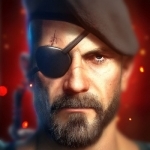
Invasion: Modern Empire
Games and Entertainment
App
Selected by Facebook as one of BEST MOBILE GAMES Invasion: Modern Empire is an online war-themed...
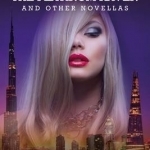
The Platinum Raven and Other Novellas
Book
"The Platinum Raven and other novellas" by Rohan Quine is a paperback comprising a collection of...
Emma @ The Movies (1786 KP) rated Love and Monsters (2021) in Movies
Apr 25, 2021
This is the nearest I've gotten to having a surprise film without the cinema. Netflix, I applaud you.
The world has been ravaged by a plague of mutated animals and the remaining humans have been in hiding for the last seven years. But Joel's life has changed and now he wants to leave the colony to find the girl he loved when the world changed. The only problem? She's 85 miles away, and he's a little inept.
I really love a good disaster/apocalyptic film, and the "how it happens" portion is usually my favourite part. There's only a small amount of that, and I think they could have gone into that slightly more (because I always love an origin story). What we do get here though leads us in well and gives us a very quick and solid summation of what we need to know.
There's a slight Lost feeling to the whole film, and that's not a bad thing, it gave it a very comfortable vibe. What the story was showing the viewer, and where it leads were wonderfully crafted... and let's move on to the next bit before I start gushing.
Dylan O'Brien plays the lead role of Joel, as well as supplying his voiceover for the film as well, and both bits were just perfect. He's humorous, sweet, courageous and a bit scared from time to time, and you see that evolve throughout the film. There are times where you might want to give him a talking to about how the real world works, but ultimately he is exactly right for this story.
Along his journey, Joel meets Clyde (Michael Rooker) and Minnow (Ariana Greenblatt, who I felt like I knew but couldn't place. If you look her up you'll discover she is Young Gamora). These two are such an entertaining duo. Bonded through crisis, they're taken their own way and when they meet Joel they form a new connection and help him to become the person he needs to be. It was so well thought-out, and honestly, they nailed the casting. I'd happily watch a sequel of those two on their adventures.
Love and Monsters combines the film and the voiceover so well that it gives you a seamless story that isn't filled with forced scenes that are trying to get necessary points across. Every scene added value for me.
Looking at the effects and design you can tell someone had fun creating the creatures and landscape. They're vibrant and inventive, and the fact that they clearly thought through everything from the environments each colony live in, to what the creatures do, is just a delight on screen. I think the crab is by far my favourite example of this.
For a film I loved this much, I'm surprised at how little I've written. Are there things I could nitpick over? Possibly. But while there are things I'd have loved to see in the film, what we were given was exactly what it needed to be. There was a bit of everything and some moments of emotion that I really wasn't expecting. I'm just so glad I saw this film, and I had absolutely no hesitation in the score I gave this film.
Originally posted on: https://emmaatthemovies.blogspot.com/2021/04/love-and-monsters-movie-review.html
The world has been ravaged by a plague of mutated animals and the remaining humans have been in hiding for the last seven years. But Joel's life has changed and now he wants to leave the colony to find the girl he loved when the world changed. The only problem? She's 85 miles away, and he's a little inept.
I really love a good disaster/apocalyptic film, and the "how it happens" portion is usually my favourite part. There's only a small amount of that, and I think they could have gone into that slightly more (because I always love an origin story). What we do get here though leads us in well and gives us a very quick and solid summation of what we need to know.
There's a slight Lost feeling to the whole film, and that's not a bad thing, it gave it a very comfortable vibe. What the story was showing the viewer, and where it leads were wonderfully crafted... and let's move on to the next bit before I start gushing.
Dylan O'Brien plays the lead role of Joel, as well as supplying his voiceover for the film as well, and both bits were just perfect. He's humorous, sweet, courageous and a bit scared from time to time, and you see that evolve throughout the film. There are times where you might want to give him a talking to about how the real world works, but ultimately he is exactly right for this story.
Along his journey, Joel meets Clyde (Michael Rooker) and Minnow (Ariana Greenblatt, who I felt like I knew but couldn't place. If you look her up you'll discover she is Young Gamora). These two are such an entertaining duo. Bonded through crisis, they're taken their own way and when they meet Joel they form a new connection and help him to become the person he needs to be. It was so well thought-out, and honestly, they nailed the casting. I'd happily watch a sequel of those two on their adventures.
Love and Monsters combines the film and the voiceover so well that it gives you a seamless story that isn't filled with forced scenes that are trying to get necessary points across. Every scene added value for me.
Looking at the effects and design you can tell someone had fun creating the creatures and landscape. They're vibrant and inventive, and the fact that they clearly thought through everything from the environments each colony live in, to what the creatures do, is just a delight on screen. I think the crab is by far my favourite example of this.
For a film I loved this much, I'm surprised at how little I've written. Are there things I could nitpick over? Possibly. But while there are things I'd have loved to see in the film, what we were given was exactly what it needed to be. There was a bit of everything and some moments of emotion that I really wasn't expecting. I'm just so glad I saw this film, and I had absolutely no hesitation in the score I gave this film.
Originally posted on: https://emmaatthemovies.blogspot.com/2021/04/love-and-monsters-movie-review.html
Night Reader Reviews (683 KP) rated Scavengers in Books
Dec 5, 2020
Surprisingly amazing book!!
Scavengers by Alessandra Melville is ideal for those who like post-apocalyptic stories. While readers won’t find zombies in these pages they will discover a world with Fallout tones mixed with Divergent.
Olivia Taylor lives safely within the confines of the Community along with other survivors. This Community was founded after a virus outbreak to protect the survivors from raider attacks. Unfortunately not all is perfect in the Community. Soaring temperatures and a lack of resources mixed with the ever present threat of discovery cause the Community’s numbers to drop, resulting in the need for a Scavenging trip. Olivia and all the other children of the Community that are of age report to volunteer to scavenge and this year she is finally picked. Now along with four others Olivia must leave the safety of the Community in an attempt to bring back supplies, food, and new members or not come back at all.
Before the foundation of the Community disaster struck the world. A virus ran rampant and high temperatures cause drought and dehydration. Out of desperation the entire Taylor family leaves their home, along with many others, in search of a safer place to live. Yet in a world that is falling apart danger is everywhere and the journey is not an easy one. Finally they meet up with others fleeing the city but they have to stop and wonder if anywhere is safe anymore.
I was very happy to find halfway through the book that it changes focus from Olivia to Grace. This answered many questions that I was beginning to forum but was afraid I would never get an answer too, and yet did not explain everything. The book is also well detailed and I can sense a well thought out backstory driving everything. I wanted more out of the book in the end for both parts of the story. The cliffhangers and unanswered questions would easily be fixed with a sequel that I feel this book deserves. Although this is a full length book it still felt more like a teaser than anything.
Teens and young adults will enjoy this book just as much if not more so than adults. While there are hints toward sexual activities both wanted and not nothing happens with any detail and will go over the heads of many young readers. The young readers will enjoy the story and I suppose some of the older readers will start questioning just how these events came to pass. I rate this book 4 out of 4. This book deserves a sequel. It is very well written and an enjoyable book with a style that reminded me of Hunger Games (along with a few others previously mentioned). It could easily make itself at home on shelves right alongside other such dystopian books. This book is so gripping a read that many reader should be able to finish it in just a couple of days.
Scavengers | Book| Austin Macauley Publishers
Olivia Taylor lives safely within the confines of the Community along with other survivors. This Community was founded after a virus outbreak to protect the survivors from raider attacks. Unfortunately not all is perfect in the Community. Soaring temperatures and a lack of resources mixed with the ever present threat of discovery cause the Community’s numbers to drop, resulting in the need for a Scavenging trip. Olivia and all the other children of the Community that are of age report to volunteer to scavenge and this year she is finally picked. Now along with four others Olivia must leave the safety of the Community in an attempt to bring back supplies, food, and new members or not come back at all.
Before the foundation of the Community disaster struck the world. A virus ran rampant and high temperatures cause drought and dehydration. Out of desperation the entire Taylor family leaves their home, along with many others, in search of a safer place to live. Yet in a world that is falling apart danger is everywhere and the journey is not an easy one. Finally they meet up with others fleeing the city but they have to stop and wonder if anywhere is safe anymore.
I was very happy to find halfway through the book that it changes focus from Olivia to Grace. This answered many questions that I was beginning to forum but was afraid I would never get an answer too, and yet did not explain everything. The book is also well detailed and I can sense a well thought out backstory driving everything. I wanted more out of the book in the end for both parts of the story. The cliffhangers and unanswered questions would easily be fixed with a sequel that I feel this book deserves. Although this is a full length book it still felt more like a teaser than anything.
Teens and young adults will enjoy this book just as much if not more so than adults. While there are hints toward sexual activities both wanted and not nothing happens with any detail and will go over the heads of many young readers. The young readers will enjoy the story and I suppose some of the older readers will start questioning just how these events came to pass. I rate this book 4 out of 4. This book deserves a sequel. It is very well written and an enjoyable book with a style that reminded me of Hunger Games (along with a few others previously mentioned). It could easily make itself at home on shelves right alongside other such dystopian books. This book is so gripping a read that many reader should be able to finish it in just a couple of days.
Scavengers | Book| Austin Macauley Publishers
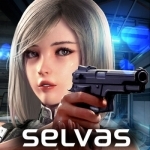
Fatal Raid - No.1 FPS
Games
App
◆ Sign-up now to Fatal Raid and receive your rewards~! ◆ Get 2600 Gems, 300 Energy, Character...
